STMicroelectronics STM32F446ZCT6 +BOM
The STMicroelectronics STM32F446ZCT6 is an ARM Cortex-M4-based MCU with FPU, running at up to 180 MHz. It features 256 KB Flash, 128 KB SRAM + 4 KB backup SRAM, and offers rich peripherals: USB OTG HS/FS, 2 CAN, 3 ADCs, 17 timers, and 20 communication interfaces. In LQFP144 package, industrial temp range (-40°C to +105°C), ideal for industrial control, consumer electronics, and embedded systems requiring high performance and low power.
STMicroelectronics STM32F446ZCT6's Features
1. Core and Performance
Processor: Features an Arm® Cortex®-M4 32-bit core with an integrated Floating-Point Unit (FPU) and Digital Signal Processing (DSP) instructions. Equipped with an Adaptive Real-Time Accelerator (ART Accelerator™) for zero-wait-state execution from Flash memory. Runs at a maximum frequency of 180 MHz with a performance of 225 DMIPS.
Memory Protection Unit (MPU): Supports up to 8 protected regions to enhance application security.
2. Memory Configuration
Flash Memory: 256 KB (for Z model) for program and data storage, supporting in-place code execution.
SRAM:
System SRAM: 128 KB (112 KB + 16 KB) with high-speed read/write (0 wait states).
Backup SRAM: 4 KB, powered by VBAT in standby mode for data retention.
3. Peripherals and Interfaces
Communication Interfaces
General-Purpose Serial Ports:
USART: 4 USARTs (up to 11.25 Mbit/s) and 2 UARTs, supporting LIN, IrDA, and modem control.
SPI: 4 SPI interfaces (up to 45 Mbit/s), 3 of which can multiplex as I²S audio interfaces (supporting 8–192 kHz sampling rates).
I²C: 4 I²C interfaces (standard/fast mode, up to 1 MHz), compatible with SMBus/PMBus.
High-Speed Interfaces:
USB: 1 USB OTG HS (480 Mbit/s) and 1 USB OTG FS (12 Mbit/s), supporting host/device/OTG modes with built-in PHY.
CAN: 2 CAN 2.0B controllers (up to 1 Mbit/s) for automotive and industrial communication.
SDIO/MMC: 1 SDIO interface for SD/MMC cards (up to 48 MHz).
Other Interfaces:
QuadSPI: Supports quad-channel SPI Flash with 8/16/32-bit access and up to 256 MB addressing.
HDMI-CEC: 1 HDMI Consumer Electronics Control interface for AV device management.
SPDIF-Rx: 1 SPDIF receiver supporting IEC-60958 and IEC-61937 audio streams.
Analog and Timers
ADC/DAC:
ADC: 3 x 12-bit ADCs with up to 2.4 MSPS sampling rate, supporting 24-channel scan mode and synchronous sampling.
DAC: 2 x 12-bit DACs with buffered/non-buffered modes, output voltage range 0 to VREF+.
Timers:
Advanced Control Timers: 2 (TIM1, TIM8) with three-phase PWM and dead-time control for motor drive.
General-Purpose Timers: 10 x 16/32-bit timers for input capture, output compare, and PWM generation.
Basic Timers: 2 x 16-bit timers (TIM6, TIM7) for DAC triggering and simple timing.
Watchdogs: Independent Watchdog (IWDG) and Window Watchdog (WWDG) for system reliability.
Other Peripherals:
Camera Interface (DCMI): Supports 8–14-bit parallel interfaces with up to 54 MHz pixel clock for CMOS sensors.
Flexible Memory Controller (FMC): Supports SRAM, PSRAM, SDRAM, NOR/NAND Flash via 16-bit data bus.
Real-Time Clock (RTC): Sub-second accuracy with a hardware calendar, powered by VBAT, supporting alarms and periodic interrupts.
4. Power and Low Power
Power Range:
Main Power (VDD): 1.7 V to 3.6 V (1.7 V minimum with external power supervisor).
Analog Power (VDDA): Matched to VDD, supporting independent reference voltage (VREF+).
Backup Power (VBAT): 1.65 V to 3.6 V for RTC and backup registers.
Low-Power Modes:
Sleep Mode: CPU halted, peripherals active; wake-up in 6 clock cycles.
Stop Mode: Clocks off, SRAM/registers retained; typical power as low as 0.12 mA.
Standby Mode: Voltage regulator off; typical power as low as 1.28 µA, wake-up via RTC.
5. Packaging and Pins
Package: LQFP144 (20x20 mm, 144 pins) with up to 114 GPIOs, some supporting 5V tolerance.
Pin Functions:
GPIO: Supports input/output/multiplexed/analog modes, with some pins capable of fast switching (up to 90 MHz).
Debug Interfaces: SWD and JTAG for on-chip debugging and programming.
6. Electrical and Temperature Characteristics
Operating Temperature: -40°C to +105°C (industrial grade, suffix “7”).
Electromagnetic Compatibility (EMC): Supports Spread Spectrum clock generation to reduce EMI.
Reliability: Built-in CRC check unit for Flash data integrity, compliant with IEC 60335-1 standards.
STMicroelectronics STM32F446ZCT6's Applications
The STM32F446ZCT6 is a high-performance microcontroller based on the Arm® Cortex®-M4 core. With its rich peripherals, low-power features, and industrial-grade reliability, it is widely applicable in the following fields:
1. Industrial Automation and Control
Motor Drive and Inverters
Equipped with 2 advanced control timers (TIM1/TIM8), supporting three-phase PWM and dead-time control, it can directly drive servo motors, stepper motors, or frequency converters. Combined with the CAN bus (2 CAN 2.0B channels) and high-speed ADCs (3 12-bit ADCs with a 2.4 MSPS sampling rate), it is suitable for real-time control and feedback adjustment of industrial robots and intelligent manufacturing equipment.
Industrial Communication and Gateways
Integrating 20 communication interfaces, including USB OTG HS/FS, QuadSPI, FMC (Flexible Memory Controller), and multiple sets of UART/SPI/I²C, it supports industrial protocols such as Modbus and CANopen. It can serve as an edge computing node or an industrial Internet of Things (IoT) gateway to realize device networking and data interaction.
Sensor and Monitoring Systems
The high-precision ADCs and DACs (2 12-bit DACs) are suitable for industrial sensor data acquisition (such as pressure and temperature monitoring). Together with the real-time clock (RTC) and backup SRAM, they can record key data and ensure no data loss during power failure, applicable to smart meters and monitoring terminals.
2. Consumer Electronics and Smart Home
Smart Home Appliances and Audio-Visual Equipment
Supporting the HDMI-CEC interface and SPDIF-Rx audio receiver, it can be used to develop smart TVs, home audio systems, or set-top boxes, enabling audio-visual equipment control and digital audio stream processing. The SPI/I²S interfaces support connecting external audio codecs to meet the requirements of high-fidelity audio playback.
Smart Home Hubs
The low-power modes (standby mode power consumption as low as 1.28 µA) and rich GPIOs (up to 114, some supporting 5V tolerance) are suitable for battery-powered smart home devices, such as smart door locks and environmental monitors. The USB OTG can connect to external storage or human-machine interfaces (HMIs) to enhance interaction capabilities.
Wearable Devices and Health Monitoring
With a built-in temperature sensor and high-speed ADC, it can collect physiological data (such as body temperature and heart rate) in real time. Combined with Bluetooth or Wi-Fi modules (connected externally via UART/SPI), it is applicable to smartwatches and medical wearable devices.
3. Medical and Portable Devices
Medical Instruments and Diagnostic Equipment
The high-precision ADCs and anti-interference design (supporting Spread Spectrum clock to reduce EMI) are suitable for signal processing of medical sensors, such as electrocardiogram (ECG) and blood glucose monitors. The low-power feature extends the battery life of portable devices, meeting the strict requirements of medical devices for stability and energy efficiency.
Handheld Devices and Mobile Terminals
Supporting the camera interface (DCMI) and parallel LCD interface (8080/6800 mode), it can be used to develop handheld barcode scanners and mobile nursing terminals for image acquisition and display. The FMC interface supports connecting external SDRAM/NAND Flash to meet the requirement of large-capacity data storage.
4. Automotive Electronics and Vehicle Systems
Vehicle Electronic Control Units (ECUs)
Two CAN buses support automotive electronic communication, complying with the ISO 11898 standard, and can be used in body control modules (BCMs), motor controllers, or vehicle sensor nodes. The industrial-grade temperature range (-40°C to +105°C) ensures stable operation in harsh vehicle environments.
In-Vehicle Entertainment and Information Systems
The SPI/I²S interfaces support in-vehicle audio processing, and the USB OTG HS can connect to in-vehicle USB devices or charging modules. The support for real-time operating systems (RTOS) and MPU (Memory Protection Unit) enhances system security, complying with automotive functional safety standards.
5. Communication and Internet of Things (IoT)
Edge Computing and Industrial IoT
With a 180 MHz main frequency and DSP instruction set, it can realize data preprocessing (such as filtering and encryption) at the edge node, reducing the load on the cloud. Supporting the SDIO/MMC interface to connect external memory cards, it is applicable to data recorders or IoT gateways.
Wireless Communication Devices
By connecting external Wi-Fi/5G modules via UART/SPI, it can build IoT terminal devices (such as smart sensor nodes and environmental monitoring stations). The low-power mode is suitable for battery-powered wireless sensor networks (WSNs), extending the deployment cycle of devices.
6. Aerospace and Industrial IoT
Embedded Control Systems
In avionics equipment, it is used in drone flight control systems and satellite payload control. Utilizing its high reliability and anti-interference capabilities (CRC check, EMC design) to ensure the stable operation of mission-critical applications.
Energy and Power Equipment
Suitable for smart grid terminals and power monitoring equipment, it can monitor grid parameters in real time via the CAN bus and ADC. Combined with the FMC to connect external Flash for storing historical data, it meets the requirements of the power system for real-time performance and data integrity.
Summary
With the comprehensive advantages of a high-performance core, rich peripherals, low-power design, and industrial-grade reliability, the STM32F446ZCT6 becomes an ideal choice for cross-field embedded applications. Its flexibility and scalability enable it to quickly adapt to the needs of different scenarios, providing efficient solutions from high-precision control to low-power IoT.
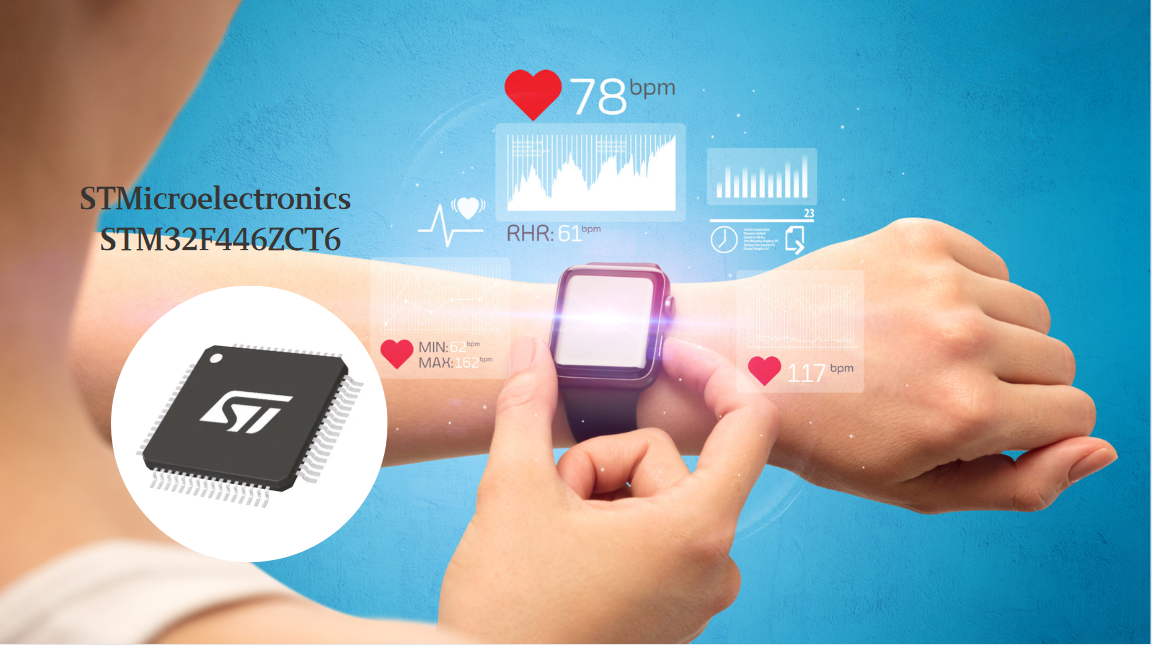
STMicroelectronics STM32F446ZCT6's Attributes
| Type | Description |
|---|---|
| Category | Integrated Circuits (ICs) Embedded Microcontrollers |
| Mfr | STMicroelectronics |
| Series | STM32F4 |
| Packaging | Tray |
| Part Status | Active |
| DigiKey Programmable | Verified |
| Core Processor | ARM® Cortex®-M4 |
| Core Size | 32-Bit Single-Core |
| Speed | 180MHz |
| Connectivity | CANbus, EBI/EMI, I2C, IrDA, LINbus, SAI, SD, SPDIF-Rx, SPI, UART/USART, USB, USB OTG |
| Peripherals | Brown-out Detect/Reset, DMA, I2S, LVD, POR, PWM, WDT |
| Number of I/O | 114 |
| Program Memory Size | 256KB (256K x 8) |
| Program Memory Type | FLASH |
| RAM Size | 128K x 8 |
| Voltage - Supply (Vcc/Vdd) | 1.7V ~ 3.6V |
| Data Converters | A/D 24x12b; D/A 2x12b |
| Oscillator Type | Internal |
| Operating Temperature | -40°C ~ 85°C (TA) |
| Mounting Type | Surface Mount |
| Supplier Device Package | 144-LQFP (20x20) |
| Package / Case | 144-LQFP |
| Base Product Number | STM32F446 |
STMicroelectronics STM32F446ZCT6's Datasheet
STMicroelectronics STM32F446ZCT6's Symbol and Footprint
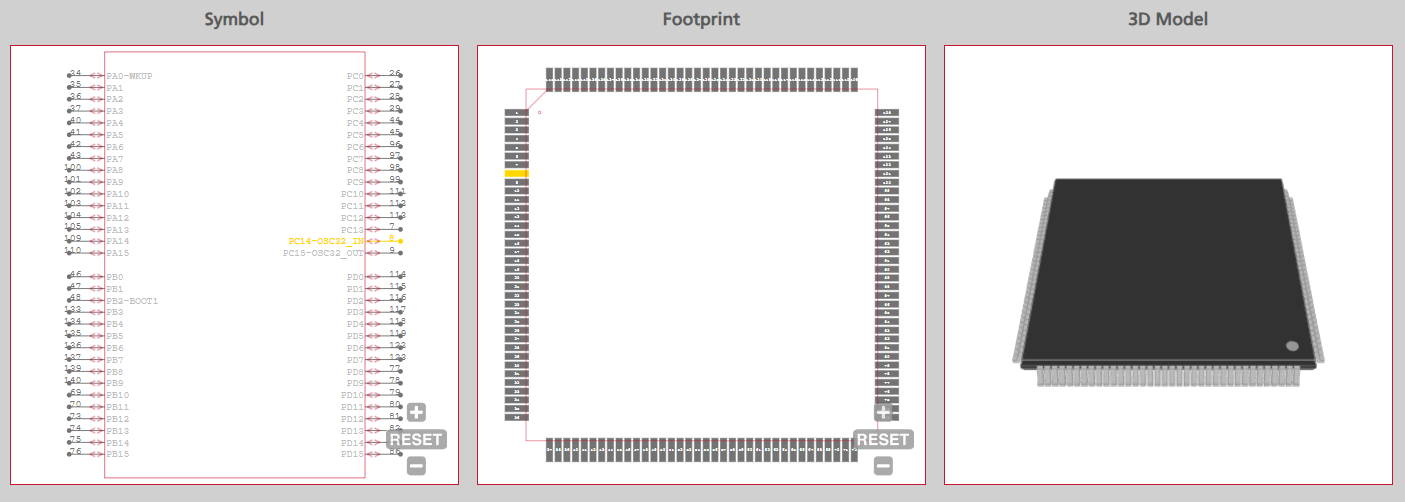
STMicroelectronics STM32F446ZCT6's Category-Microcontrollers
Microcontrollers are the brain of modern embedded systems, integrating processing cores, memory, and peripherals on a single chip to enable intelligent control across diverse fields. These tiny yet powerful devices, like Arm® Cortex®-based solutions, combine high-performance computing with energy efficiency, supporting real-time operations in industrial automation, consumer electronics, and medical devices. With evolving technologies, microcontrollers now feature advanced capabilities such as AI acceleration, secure connectivity, and low-power modes to meet the demands of the IoT era.
STMicroelectronics STM32F446ZCT6 stands out as a prime example, leveraging a 180 MHz Cortex-M4 core with FPU and DSP instructions for 225 DMIPS performance. It integrates 256 KB Flash, 128 KB SRAM, and rich peripherals like USB OTG HS, CAN buses, and high-speed ADCs, enabling precise control in motor drives and real-time data processing in industrial gateways. Its low-power design (standby mode at 1.28 µA) and industrial-grade reliability (-40°C to +105°C operation) make it ideal for edge computing and harsh environments. As a versatile solution, the STM32F446ZCT6 exemplifies how microcontrollers drive innovation across automotive, medical, and IoT applications, blending performance, efficiency, and adaptability seamlessly.
STM32F446ZCT6's Manufacturer-STMicroelectronics
STMicroelectronics has established itself as a pioneer in the microcontroller (MCU) domain, driving innovation and setting industry standards. The company's STM32 family, rooted in Arm® architectures, revolutionized low-power and high-performance MCUs. For instance, the STM32L series pioneered ultra-low-power designs with sub-microamp standby modes, ideal for IoT and battery-powered devices, while the STM32F7/F4 series delivers high-performance computing with Cortex-M7/M4 cores, reaching up to 225 DMIPS for industrial automation and AI-edge applications.
The firm's achievements span across technical breakthroughs and market leadership. It introduced features like the ART Accelerator™ for zero-wait Flash execution, FlexPowerControl for dynamic voltage scaling, and integrated security engines (AES, TRNG) to address evolving cybersecurity needs. STMicroelectronics also prioritizes ecosystem development, offering comprehensive tools, RTOS compatibility, and a vast partner network, enabling developers to accelerate time-to-market.
With over 700 million STM32 MCUs shipped globally, the company dominates sectors from automotive (ISO 26262-compliant MCUs) to medical devices. Its commitment to sustainability is evident in ECOPACK® certifications and energy-efficient designs. The STM32F446ZCT6, with its 180 MHz Cortex-M4 core and industrial-grade reliability, exemplifies how STMicroelectronics continues to redefine MCU capabilities, blending performance, efficiency, and versatility for next-gen embedded solutions.
STM32F446ZCT6 vs STM8S903F3M3T
| Mfr Part | ||
|---|---|---|
| Category | Embedded - Microcontrollers | Embedded - Microcontrollers |
| Manufacturer | STMicroelectronics | STMicroelectronics |
| Series | STM32F4 | STM8S |
| Packaging | Tray | Tape & Reel (TR) |
| Product Status | Active | Active |
| Core Processor | ARM® Cortex®-M4 | STM8 |
| Core Size | 32-Bit Single-Core | 8-Bit |
| Speed | 180 MHz | 16 MHz |
| Connectivity | CANbus, EBI/EMI, I²C, IrDA, LINbus, SAI, SD, SPDIF-Rx, SPI, UART/USART, USB, USB OTG | I²C, IrDA, LINbus, SPI, UART/USART |
| Peripherals | Brown-out Detect/Reset, DMA, I²S, LVD, POR, PWM, WDT | Brown-out Detect/Reset, POR, PWM, WDT |
| Number of I/O | 114 | 16 |
| Program Memory Size | 256 KB (256K x 8) | 8 KB (8K x 8) |
| Program Memory Type | FLASH | FLASH |
| EEPROM Size | - | 640 x 8 |
| RAM Size | 128K x 8 | 1K x 8 |
| Voltage - Supply (Vcc/Vdd) | 1.7V ~ 3.6V | 2.95V ~ 5.5V |
| Data Converters | A/D 24x12b; D/A 2x12b | A/D 5x10b |
| Oscillator Type | Internal | Internal |
| Operating Temperature | -40°C ~ 85°C (TA) | -40°C ~ 125°C (TA) |
| Mounting Type | Surface Mount | Surface Mount |
| Package / Case | 144-LQFP (20x20) | 20-SO |
| Supplier Device Package | 144-LQFP | 20-SO |
Hot-selling products of SIC
71421LA55J8 UPD44165184BF5-E40-EQ3-A SST39VF800A-70-4C-B3KE IS66WV1M16DBLL-55BLI-TR AS4C32M16SB-7BIN W25Q16FWSNIG
AS7C34098A-20JIN 752369-581-C W957D6HBCX7I TR IS61LPS12836EC-200B3LI MX25L12875FMI-10G QG82915PL
Product information is from SIC Electronics Limited. If you are interested in the product or need product parameters, you can contact us online at any time or send us an email: sales@sic-chip.com.





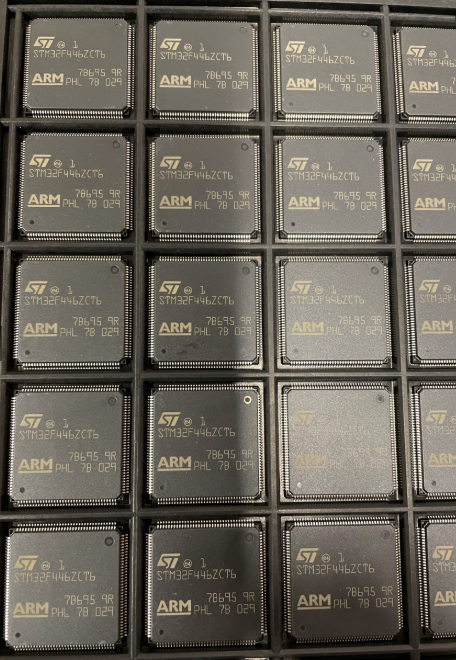

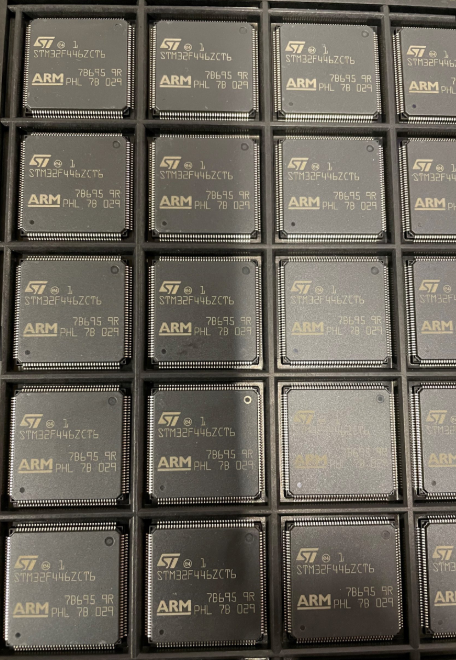
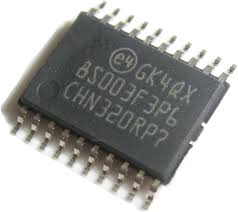




 Wishlist (0 Items)
Wishlist (0 Items) 